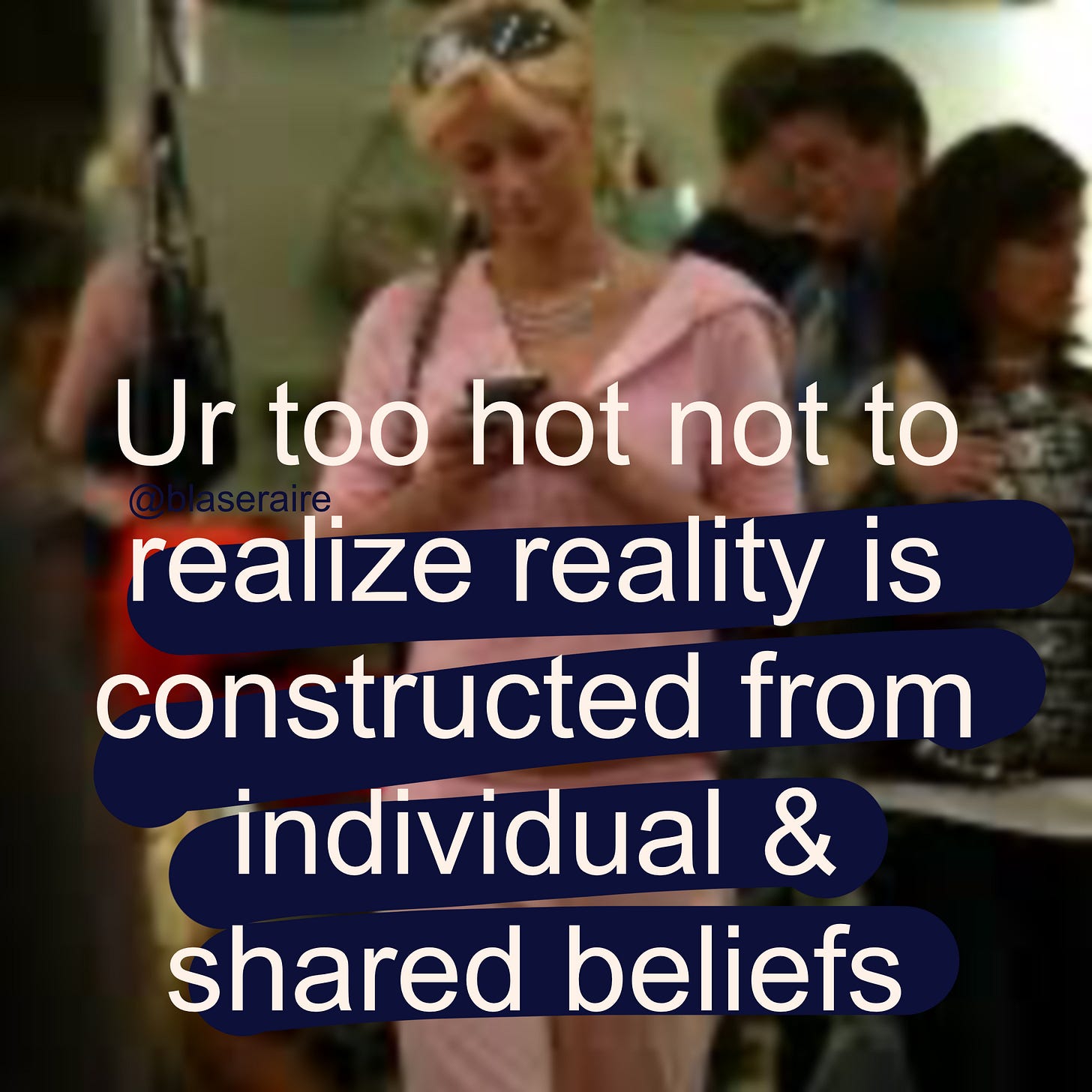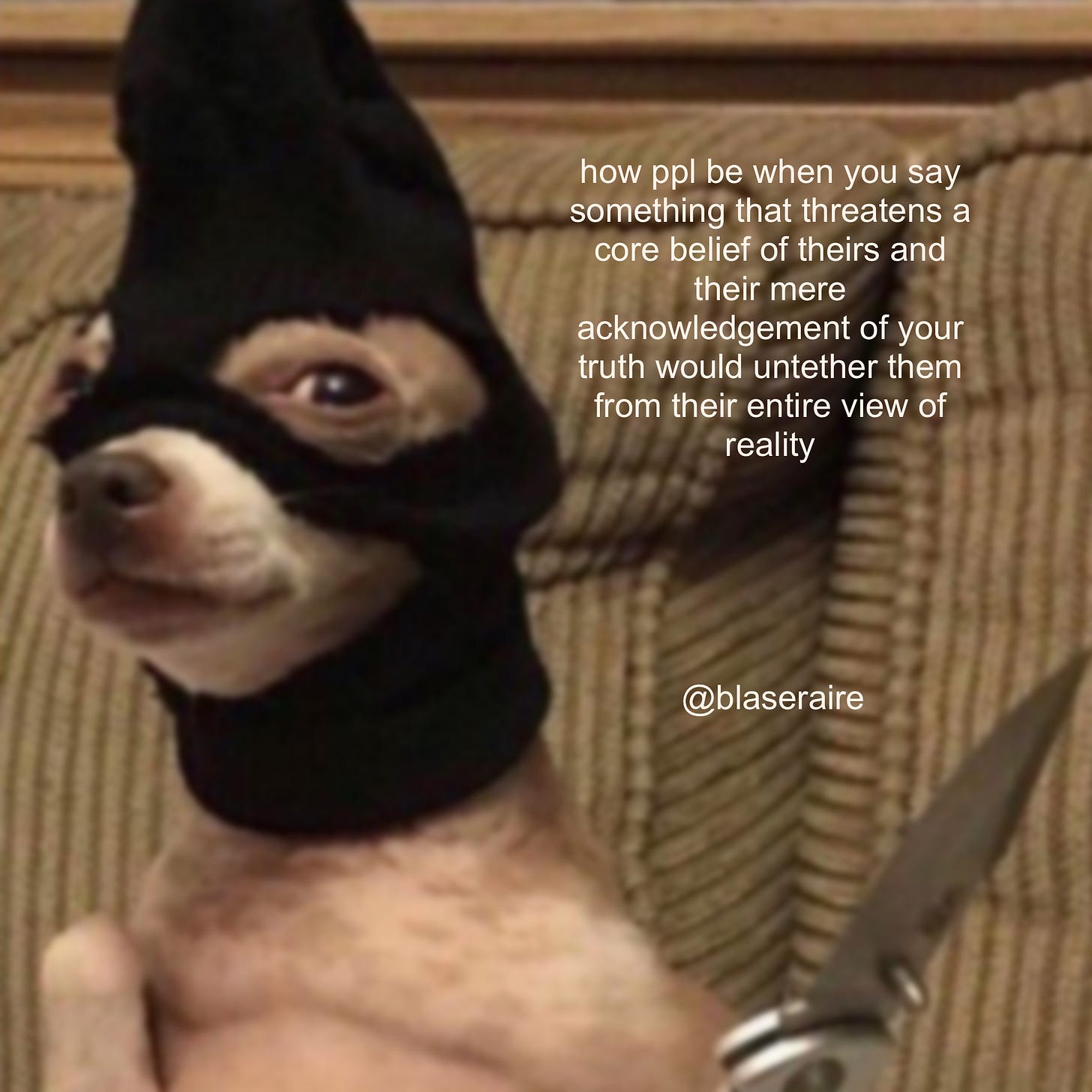Reality Check: How Belief Systems Scaffold Our Individual & Collective Experiences
Unit 4: Astrology & Money, Topic 4: Beliefs & Reality
Hello Angel,
A quick note on how to engage with this article.
1. Like a class curriculum, each topic is part of a larger unit that dives into a distinct subject. Think of it like a vinyl record, each topic can be enjoyed as a track or fully experienced like an album. Subscribe to get them weekly in your inbox!
2. No knowledge gatekeeping here! We’re neophytes ourselves, presenting our laywomen’s research from topics that make us curious. If you see a bolded term, it is defined in the glossary at the end of this article.
3. Look out for underlined passages, these are your portal down the knowledge rabbit hole and lead to further reading. Insatiable? Original sources are merchandised on our interactive reference page at the end.
4. This is a *reciprocal* experience! We invite you to contemplate the discussion questions at the back. Or even cooler, forward the topic to a friend, colleague, or your crush and start a meaningful conversation.
Curiously,
Ambi & Abbey
As a reminder, the original question that led us here, was, “What is more real - money or astrology?”
We’ve defined both money and astrology. But we have yet to define what it means to be real.
An illusory term, Merriam Webster takes a stab, describing it as “having objective independent existence,” “not artificial, fraudulent, or illusory,” “occurring or existing in actuality.”
Sure, money has a dollar bill to stand for its objective existence, shoutout Mr. Benjy, but astrology has Co-Star. And when it comes to being fraudulent, it might be safe to say that money’s power for deceit holds more weight than that of the stars.
Close enough for government work
“They’re not twins, they’re sisters,” they say. Yeah, it relates to brows or t*ts, but this also relates to beliefs.
Just because they’re not identical, they can live in the same family.
Beliefs are a fundamental aspect of human cognition and consciousness. We hold beliefs for a variety of reasons, and they play crucial roles in shaping our understanding of the world, guiding our behavior, and helping us navigate life.
We believe in money because it serves as a conduit of exchange, a store of value, and a unit of account. We believe in astrology for a sense of identity, social and cultural influence, psychological comfort.
The point: there’s a collective contract in place that makes these things true. There’s been an unanimous shake of the head, a universal “yes ma’am,” to the concepts. Without individuals sharing in the “truth” of these constructs, neither would exist.
The future is a scary place
We hold beliefs for a myriad of reasons. We wish for psychological and emotional comfort, so we find patterns between things that provide stability and predictability.
We find it hard to be floating on a rock that’s hurling through space and because of that decisions can be hard to make. Beliefs help act as a compass in this otherwise abyss.
Some beliefs have evolutionary roots — helping us adapt and survive in different environments. They act as glue for group cohesion, allowing us to share in rituals and values that scratch our wired tribal itch.
In many ways, beliefs are tethers we can hold onto in the now, because a pesky, amorphous, unknown thing looms in front of us: the future.
“Fundamentally, fear of the future has an evolutionary background: the unknown has always represented a possible threat. Our body prepares itself for potential dangers by summoning all of its strength.”
As we’ve evolved over time, our big beautiful brains have conjured up threads of existence that help us live “stronger” to prepare for what this obscure future might look like.
There’s a lot of approaches to dealing and making sense of this future. Some turn to science, dedicating their time here to research that solves the observed problems of say the body. Others devote their lives to swapping numbers, ie. trading commodities. Others turn their lives to trading ideas, writing, painting, singing about the human experience. And still others root their lives in rituals, passing along stories of the past to frame today.
Over the last century, we have seen a boom in how technology has better helped us to forecast what come. From the weather to political unrest, we seem to have a calculation for what shape these things might take.
But future prediction is not new. We have been doing this as far back as the earliest civilizations, who identified individuals with particular gifts for calculating futures.
Oracles, shamans, and prophets (oh, my!) were turned to for guidance — they were revered and trusted for their methodology of mastering a theoretical rule-based system. Think: astrology, palmistry, numerology, Tarot. They were the pre-historical forecast manufacturers.
Fast forward to modern day, our figureheads of direction now often take the form of political theorists, scientists, sociologists, and more specifically in the money arena — economists, financial analysts, quants.
These future-predictors of today fall into two main categories:
those that treat human history as a series of patterns and forecast the future based on past data, ie. what happened before allows us to predict relatively what to expect; “history repeats itself” vibe
those that hold that future will look completely new given the technological and economic innovation occurring, ie. a set of net new potential realities that are more different than similar from past realities.
While these two groups are different in methodology, they are similar in that they are made of humans who hold beliefs and are drawing upon these to frame what they pose the future might look like. A series of arbitrary patterns allows them to draw a prediction that simply states: this might happen.
As Amanda Rees, a University of York scientist puts it, “Ultimately, neither approach is necessarily more useful than the other, and that’s because they both share the same fatal flaw—the people framing them.”
Cognitive beliefs serve as our mind's tool for comprehending and maneuvering through the intricate fabric of our surroundings. They represent our mental constructs of how the elements in our environment are anticipated to function and their interrelationships, essentially serving as the expected patterns for the world. These cognitive templates are indispensable for efficient learning and frequently play a pivotal role in ensuring our survival.
We’re hardwired to ensure that we pass spawning our offspring. And beliefs help us get there. The most highly regarded future forecasters of present-day may not be speaking tongues or interpreting tea leaves. But even if they’re studying stocks and market models — they’re still framing their reality on a set of patterns. Something that is both vital and destructive for passing on the family name.
Real begins with you
When we ask the question what is more real? The truth is … there is no truth.
There are constructs that collectively we have decided help us live more organized lives, more streamlined, cooperative existences. But they are no more than figments of our group imagination.
Someone, somewhere posed the thought that stars could help us navigate, money could help us more than bartering. Others said, “you right.”
These beliefs are in many ways a byproduct of our shared desire to deal with the mystery of this existence.
So when it comes to what’s more real — perhaps the answer begins with you….of course, you have to participate in the beliefs that keep society in tact, ie. Venmo to split dinner, giving a $20 bill for takeout rather than trading your last sourdough starter.
But while playing the game, you get to decide…what currency do you want live by?
Discussion Questions:
What currency do you want to live by, ie. time, money, passion, connection?
Have you had any recent experiences that caused you to rethink your position on a particular issue or idea?
When’s the last time you were unwilling to consider a viewpoint differing from your own?
How can you deploy greater curiosity about your own beliefs? The beliefs of others?
Glossary:
Beliefs: beliefs are mental attitudes or convictions that an individual or a group holds to be true or considers as knowledge or reality. These convictions can be about a wide range of subjects, including factual information, values, opinions, and interpretations of the world. Beliefs are an essential aspect of human cognition and are often shaped by a combination of personal experiences, cultural influences, upbringing, education, and individual reasoning.
Evolutionary Background: evolutionary background typically refers to the historical and genetic context within which an organism or species has evolved. It encompasses the various factors and processes that have shaped the development and adaptation of an organism over time.
Mental Constructs: mental construct refers to an abstract or cognitive representation created within the mind to help understand, interpret, or make sense of various aspects of the world. Mental constructs are the mental models, concepts, or frameworks that individuals develop to organize and categorize information, ideas, and experiences. These constructs are not tangible or physical entities but are rather products of mental processes.
Sources:
Haunted by Fear of the Future? How to Overcome It






Beliefs, another construct void of tangibility? 🤯